|
Agriculture forms the bedrock of the Ugandan economy, particularly in rural areas, where 80% of people in Uganda engage in agriculture, thus dictating the pace and prosperity of daily life. Subsistence farming is predominant, with families cultivating crops like matooke (green bananas, a staple for many), maize, beans, cassava, sweet potatoes, and groundnuts, primarily for their own consumption. Cash crops such as coffee, tea, and cotton also play a crucial role, providing income for school fees, healthcare, and other necessities, with coffee being the country's main export. (Its other main exports are fish, tea, gold and cotton. Recent oil discoveries are likely to boost the economy further however Uganda borders on the newly established Republic of South Sudan and the potential for instability there particularly if north Sudan switches off South Sudan's oil pipelines that run through its territory make cause an influx of refugees in a country that that already provides shelter.) for 1,400,000 refugees mainly coming from neighboring countries, especially South Sudan and the Democratic Republic of the Congo.
Beyond farming, rural livelihoods include small businesses such as tailoring, operating tiny shops (dukas) selling essential goods, or providing boda-boda services. In urban areas, the economy is more diversified. Formal employment exists in government ministries, private companies, and non-governmental organisations (NGOs). However, the informal sector is vast and vital, encompassing street vending, artisanal crafts, small-scale trade, and a myriad of services. The entrepreneurial spirit is strong, with many Ugandans creating their own opportunities in a competitive environment. Education is highly valued in Uganda, seen as a crucial pathway to self-improvement and national development. School attendance is a significant part of daily life in Uganda for millions of children. Despite challenges like school fees (even in "free" universal primary and secondary education, hidden costs like uniforms and scholastic materials exist) and long distances to school, parents often make immense sacrifices to ensure their children receive an education. The school day typically runs from morning to late afternoon, with students in uniforms, participating in a standardised curriculum. The importance of discipline and respect for teachers is deeply ingrained. After-school hours are often dedicated to homework, chores, or helping with family businesses. For many, formal education is supplemented by practical skills learned at home, preparing them for the realities of their future livelihoods. |
Life in Uganda | Life in Uganda | Life in Uganda | Life in Uganda |
For more about life in Uganda including videos and photos, check out our Uganda profile pages.
More >
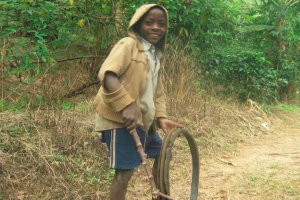 |

One of the most defining aspects of daily life in Uganda is the centrality of community and family. The extended family unit is paramount, offering a robust social safety net. Respect for elders is deeply ingrained in daily life in Uganda customs, with specific greetings and gestures of deference expected. Children are often raised by a broader network of relatives, fostering strong kinship ties.
Religious faith plays a significant role in daily life. Christianity (Catholicism and various Protestant denominations) and Islam are widely practiced, with churches and mosques forming important community hubs. Sundays are typically reserved for church services, and Fridays for mosque prayers, influencing daily routines and social gatherings. Local councils (LCs) serve as an important administrative and social structure, addressing local disputes and organising community initiatives. Food is not merely sustenance; it's a vital part of social interaction and cultural identity. The Ugandan plate is diverse, reflecting regional variations. The ubiquitous matooke, often steamed and mashed, serves as a staple for many, especially in the central and western regions. Other common starches include posho (a stiff porridge made from maize flour), sweet potatoes, cassava, rice, and Irish potatoes. These starches are typically accompanied by a rich stew or sauce. Popular options include groundnut sauce (ebiito or binsamia), beans, various meats (chicken, goat, beef, sometimes pork), or fish, especially around the Great Lakes. Leafy greens like sukuma wiki (collard greens) or dodo are also common. Street food is a vibrant part of urban life, with the "Rolex" (a rolled chapati with an omelette inside) being a beloved national snack, alongside roasted maize, samosas, and roasted plantains. Meals are often a communal affair, emphasising sharing and togetherness. Evenings in Uganda often bring a gentle winding down. In rural areas, the cool air might be filled with the sounds of children playing, adults sharing stories around a fire, or the distant beat of a drum from a communal gathering. Music and dance are integral to Ugandan life, permeating celebrations, traditional ceremonies, and even everyday moments. In urban centres, leisure activities broaden to include visiting local kafunda (bars) for a drink and conversation, watching football matches, or, for those with more disposable income, going to shopping malls, cinemas, or nightclubs. Despite the varying forms of entertainment, the emphasis remains on social connection and shared experiences. While daily life in Uganda is rich with cultural vibrancy and community spirit, it is also marked by significant challenges. Poverty, limited access to quality healthcare and education, and inadequate infrastructure (roads, electricity, clean water) remain pressing issues, particularly in remote areas. Farmers often contend with unpredictable weather patterns due to climate change, posing threats to their livelihoods. Yet, through these difficulties, the Ugandan people demonstrate remarkable resilience and an enduring spirit of optimism. The strong community bonds, a deep sense of faith, and an innate ability to find joy in simple things enable them to navigate adversity. The warmth, generosity, and welcoming nature of Ugandans are often the most striking impressions for visitors, leaving a lasting memory of a people who embody the true "Pearl of Africa" – not just in its landscapes, but in its human spirit. |
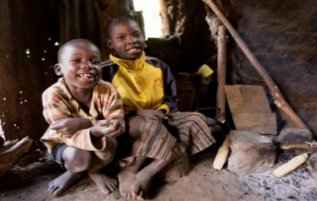 To truly understand this nation, one must delve into the intricate patterns of daily life in Uganda, observing how people live, work, and interact. While diverse ethnic groups and varying urban and rural settings paint a nuanced picture, certain rhythms and customs resonate throughout the country, offering a unique window into the Ugandan soul. For most Ugandans, especially in daily life in rural Uganda, the day begins with the sun. There is a palpable sense of purpose that accompanies the first rays of light. In countless villages, the sounds of chirping birds are quickly joined by the rustle of activity: the clink of jerrycans as women and children head to communal boreholes or wells to fetch water, often a significant distance away; the crackling of firewood being gathered; and the lowing of cattle or bleating of goats.
To truly understand this nation, one must delve into the intricate patterns of daily life in Uganda, observing how people live, work, and interact. While diverse ethnic groups and varying urban and rural settings paint a nuanced picture, certain rhythms and customs resonate throughout the country, offering a unique window into the Ugandan soul. For most Ugandans, especially in daily life in rural Uganda, the day begins with the sun. There is a palpable sense of purpose that accompanies the first rays of light. In countless villages, the sounds of chirping birds are quickly joined by the rustle of activity: the clink of jerrycans as women and children head to communal boreholes or wells to fetch water, often a significant distance away; the crackling of firewood being gathered; and the lowing of cattle or bleating of goats. Farming is often a communal effort, particularly during planting and harvesting seasons, embodying the spirit of bulungi bwansi (working together for the good of the community). Gender roles are often distinct, with women typically responsible for food preparation, childcare, and significant portions of farm work, while men may focus on heavier labour, livestock, and selling produce.
Farming is often a communal effort, particularly during planting and harvesting seasons, embodying the spirit of bulungi bwansi (working together for the good of the community). Gender roles are often distinct, with women typically responsible for food preparation, childcare, and significant portions of farm work, while men may focus on heavier labour, livestock, and selling produce.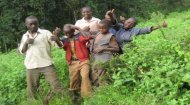



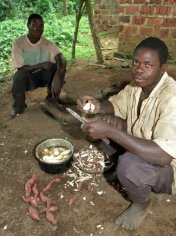 Hospitality is a cornerstone of Ugandan culture. Visitors are warmly welcomed, often offered food and drink, even if resources are scarce. Sharing a meal, typically from a communal dish, is a common practice that reinforces bonds. Greetings are elaborate and essential, often involving inquiries about one's family and well-being before any other conversation begins. The absence of a proper greeting can be considered disrespectful.
Hospitality is a cornerstone of Ugandan culture. Visitors are warmly welcomed, often offered food and drink, even if resources are scarce. Sharing a meal, typically from a communal dish, is a common practice that reinforces bonds. Greetings are elaborate and essential, often involving inquiries about one's family and well-being before any other conversation begins. The absence of a proper greeting can be considered disrespectful.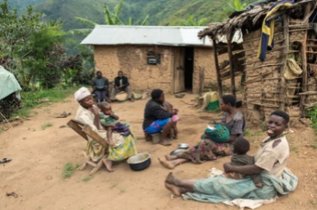 Simple pleasures like board games (such as Omweso, a traditional Mancala-style game) or listening to the radio are common. Football (soccer) is a national passion, unifying communities whether played on dusty fields or watched in local video halls.
Simple pleasures like board games (such as Omweso, a traditional Mancala-style game) or listening to the radio are common. Football (soccer) is a national passion, unifying communities whether played on dusty fields or watched in local video halls.


